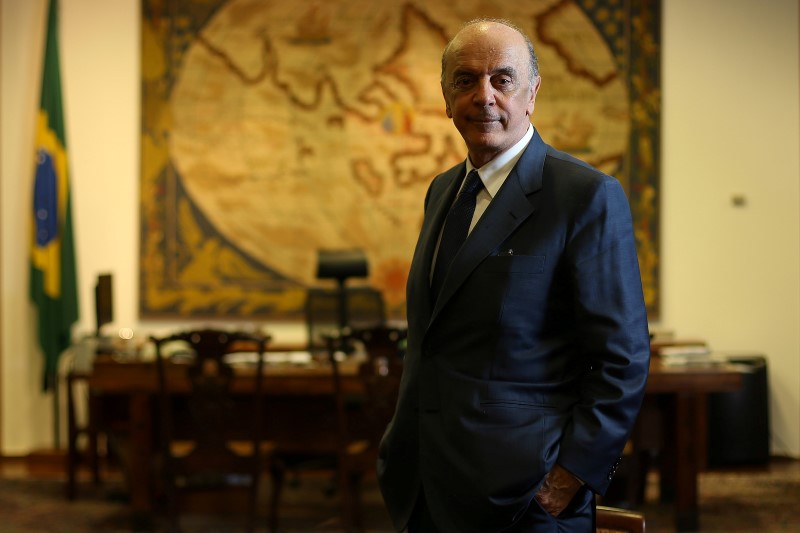By Alonso Soto and Lisandra Paraguassu
BRASILIA (Reuters) - Brazilian Foreign Minister Jose Serra warned against the excessive appreciation of the country's currency as it could hurt exporters, revealing concerns in the interim government that a stronger real could further sink an economy mired in recession.
In an interview late on Thursday, which also included written answers to questions from Reuters, Serra said the strengthening of the real, which has appreciated about 30 percent since its year low in mid-January, has reflected a fall in political uncertainty under the administration of interim President Michel Temer.
"I believe (the real) will stay around where it is," Serra said in a written response. "It would be very bad for the real to appreciate excessively because the current level only compensates for the overappreciation that we saw in a relatively recent period."
His comments appeared to contradict those of members of the economic team led by Finance Minister Henrique Meirelles, which have signaled less intervention in the currency to allow the real to float more freely.
Serra's concerns also reflected those of other Cabinet members who fear a stronger real could add more pain to what could be Brazil's worst recession in 100 years.
Temer, who replaced leftist President Dilma Rousseff in May pending an impeachment trial in the Senate over alleged budget manipulation, faces the task of rescuing an economy in tatters after the end of a decade-long commodity bonanza and years of interventionist policies.
Serra, a Cornell University graduate and former presidential contender, was one of Temer's most prominent nominations to a Cabinet of political allies that aims to defuse a legislative crisis in part blamed for the recession.
During the boom years of high commodity prices of the last decade, the real strengthened sharply to reach near parity with the U.S. dollar. When the economy soured and the political crisis boiled over in 2014, the currency had lost about three-fourths of its value to trade at over 4 per dollar.
Rousseff's suspension improved the mood of investors, and the real climbed back to now trade at 3.26 per dollar, also supported by hopes of economic stimulus in Japan and Europe.
When asked again in the interview whether he was concerned with the appreciation of the real, Serra said: "Evidently I would like to see the exchange at a competitive rate for the economy. I like to believe that will be the trend."
NO IDEOLOGY IN TRADE
After only two months in the job, Serra, who is thought to be planning a third presidential run for 2018, has marked a clear shift in foreign policy away from the leftist, regional alliances signed during the 13-year rule of Rousseff's Workers Party.
Serra blasted the trade policies and diplomacy of Rousseff and her predecessor and other potential 2018 presidential contender, Luiz Inacio Lula da Silva, as "populists."
"They negotiated against our international interests. That is its international populism," Serra said, referring to the Workers Party. "Foreign policy has to be a matter of the state, not set by party interests."
He said Rousseff made a mistake by backing the entry of socialist-led Venezuela into the Mercosur trade group of Uruguay, Argentina, Brazil and Paraguay in 2012.
Brazil has asked its partners to delay a decision to pass the Mercosur's rotating presidency to Venezuela this month, arguing that the OPEC-member nation has not fulfilled its requirements to be a full member.
"If Venezuela has not fulfilled all of its pre-requirements, then it will not assume (the presidency)," Serra said.
Mercosur could even consider suspending Venezuela from the group in the future, said Serra, adding that he was concerned about the country's human rights record amid a worsening political and economic crisis.
Serra is the first non-diplomat to be Brazil's foreign minister in more than a decade. So far, he has secured much-needed funds for a ministry that literally struggled to pay the bills of diplomats abroad, and he has increased the ministry's clout in trade policymaking.
Serra said that Brazil, along with Mercosur, will be more active in seeking bilateral trade deals to bolster the group's exports. He added that the group could seek trade deals with the United States and the Pacific Alliance bloc made up of Chile, Colombia, Mexico and Peru.

In an example of the country's more aggressive trade stance, Serra threatened to open a trade challenge against Canada for its funding of planemaker Bombardier Inc, which could hurt Brazilian rival Embraer.